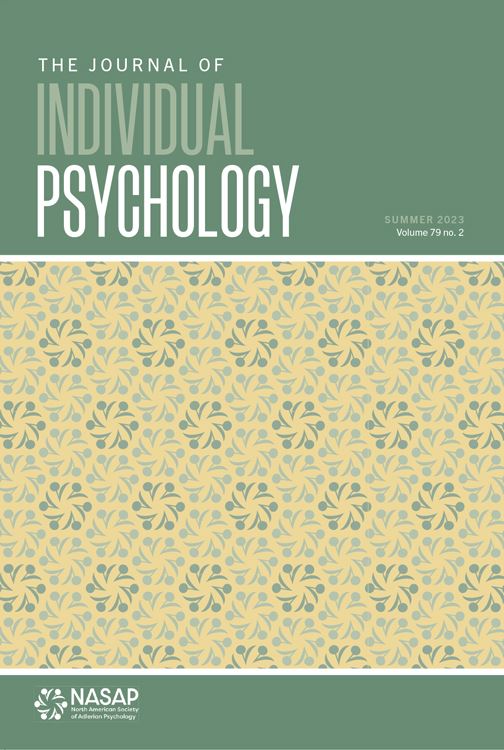The Journal of Individual Psychology provides a forum for dialogue pertaining to Adlerian practices, principles, and theoretical development. Articles relate to theoretical and research issues as well as concerns of practice and application of Individual Psychology. Below is a sample of other articles published in the Journal of Individual Psychology specifically related to Positive Discipline or Adlerian practices incorporated by Positive Discipline. These journal publications show the rich history and foundation on which Positive Discipline is based. The editors of the Journal place great emphasis on maintaining high overall quality of research and scholarly contributions. OTHER ARTICLES PUBLISHED IN THE JOURNAL OF INDIVIDUAL PSYCHOLOGY The Effectiveness of Positive Discipline Parenting Workshops on Parental Attitude and Behavior Abstract: The purpose of this study is to examine the effectiveness of a group-based parenting education program known as Positive Discipline. Positive Discipline is an Adlerian approach to parenting that emphasizes encouragement and the importance of belonging and significance. Taught in a parenting workshop, Positive Discipline attempts to teach parents concepts and tools to help them develop mutually respectful relationships through the use of structured and experiential learning. The present study uses a pre- and posttest design to evaluate the effects of these free 7-week workshops, which were offered to mostly Hispanic, mostly low-income participants in the Central Valley region of California. Results indicate that the workshops appear to be effective in influencing some aspects of parenting attitude and behavior, and that the attitudes and behavior correspond to concepts of authoritative parenting. A 3-month follow-up was also assessed, which appears to indicate that most effects persist beyond the termination of the program. Carroll, P., & Brown, P. (2020). The effectiveness of positive discipline parenting workshops on parental attitude and behavior. The Journal of
Gfroerer, K., Nelsen, J., & Kern, R. M. (2013). Positive Discipline: Helping Children Develop Belonging and Coping Resources Using Individual Abstract: Public health research shows that the authoritative parenting style protects youth from risky and dangerous behavior. The purpose of this study was to evaluate whether Adlerian-based parent education classes influence parental behavior in the direction of being more authoritative. To this end, over 1,250 participants completed assessments at the end of 110 Adlerian parenting classes in the United States and Canada. Parent-guardians reported statistically significant changes in behavior: setting clearer limits, increasing their sense of positive connection, and decreasing harshness. These changes toward a more authoritative parenting style (based on parent report of their own behaviors) were statistically significant. The greatest changes were in younger parents, women, those with the lowest income, and those with fewer children. Results were also useful for the parent educators in assessing their teaching. McVittie, J., & Best, A. M. (2009). The Impact of Adlerian-Based Parenting Classes on Self-Reported Parental Behavior. Journal of Individual Nelsen, J. (1985). The three r's of logical consequences, the three r's of punishment, and the six steps for winning children over. Individual
Featured DissertationHolliday, M. (2014). Authoritative parenting and outcomes of Positive Discipline parent training: Parenting style and perceived efficacy. (Doctoral dissertation). Available from ProQuest Dissertations and Theses database. The Adler School of Professional PsychologyThis study was designed to investigate the impact of Adlerian parent trainings on parenting style and perceived competence, in order to determine if Positive Discipline parent training courses promote the authoritative parenting style. It was hypothesized that an Adlerian parent training would both promote the authoritative style and reduce authoritarian style and permissive style. It was also hypothesized that after attending a parent training, parents would note an increase in their sense of competence as parents. The central constructs were assessed through an online survey that included a measure of parenting style (Parenting Styles and Dimensions Questionnaire; PSDQ) and a measure of parenting competence (Parent Sense of Competence; PSOC). The sample consisted of 101 parents who attended one of 26 distinct Positive Discipline parent training group classes offered in cities across the United States. For the study, parents were assessed for parenting style and competence before the start of the course, after they completed the course, and at a 3-month follow-up period. Results indicated that parents experienced significant increases in both authoritativeness and sense of competence from pre-test to post-test. There was an even stronger significance associated with the increase in authoritativeness from pre-test to the three-month follow-up. Results also confirmed the hypothesis that attendance at the parent training would lead to reduced levels of authoritarian and permissive parenting styles. The study provides empirical support for the theoretical link between the Adlerian parenting model and the authoritative parenting model.
North American Society of Adlerian Psychology's Journal of Individual Psychology Current Positive Discipline Whole School Implementation Research Report | The Positive Discipline Association receives a 5% donation for all purchases made at www.positivediscipline.com |

